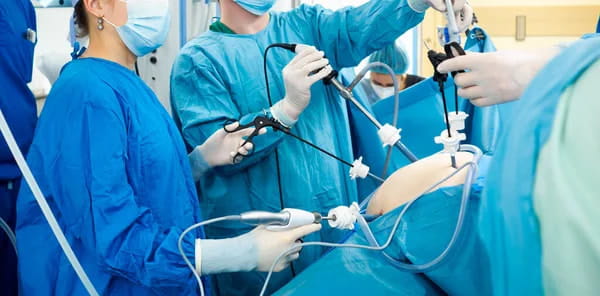Laparoscopic Surgery
What is Laparoscopic Surgery?
Laparoscopic surgery utilises a laparoscope (digital camera) to visualise the abdominal cavity through a small incision. Other small incisions are made to allow the insertion of laparoscopic instruments to operate within the abdominal cavity. Laparoscopic surgery is also called “keyhole” surgery.
Laparoscopic surgery can be diagnostic (confirm a diagnosis or assess the extent of a disease) or therapeutic (such as cholecystectomy or hernia repair).

What types of Laparoscopic Surgery does Dr Michael Chu perform?
Throughout his training and work, Dr. Michael Chu has obtained expertise in various laparoscopic procedures.
These include:
- Cholecystectomy (removal of gallbladder)
- Hernia repair
- Splenectomy (removal of spleen)
- Hepatectomy (removal of part of the liver)
- Pancreatectomy (removal of part of the pancreas)
- Adrenalectomy (removal of adrenal gland)
- Diagnostic or staging laparoscopy
What are the benefits of Laparoscopic Surgery?
Less Invasive
Reduced Pain
Faster Recovery
Reduced Risk of Infection
Less Scarring
Reduced Blood Loss
Is Laparoscopic Surgery always the better option?
Laparoscopic surgery offers several advantages over traditional or open surgery, making it a preferable choice in many cases. However, whether it is "better" can depend on the specific medical condition, patient needs, and surgical goals. It's important to note that traditional surgery may still be necessary or preferred in certain complex cases where greater visibility and access to the surgical site are required. Therefore, the choice between laparoscopic and traditional surgery should be based on a thorough evaluation and assessment by a healthcare professional, such as Dr Michael Chu.
If the procedure can be safely performed laparoscopically, Dr. Michael Chu will discuss the options with you to ensure you feel confident in choosing the best surgical approach for your condition.
Who are the best candidates for Laparoscopic Surgery?
Patients with diagnosed hernias
Laparoscopic surgery is effective for treating various hernias, including obturator hernia.
Patients seeking minimally invasive procedures
Generally, patients who are in good overall health and do not have conditions that contraindicate minimally invasive surgery (such as severe adhesions from previous surgeries) are suitable candidates.
Please note that Dr Michael Chu will still need to evaluate each case to determine whether you are a good candidate and the most appropriate surgical approach for you.
Why choose Dr Michael Chu for Laparoscopic Surgery?
Dr Michael Chu has extensive training and expertise in both open and laparoscopic surgical approaches, ensuring that patients receive the most effective and appropriate treatment for their condition. With extensive expertise in this advanced surgical method, Dr Chu provides exceptional care for a range of conditions, ensuring minimal discomfort and faster healing for his patients.
Learn more about Dr Michael Chu's medical background, credentials, and expertise.
